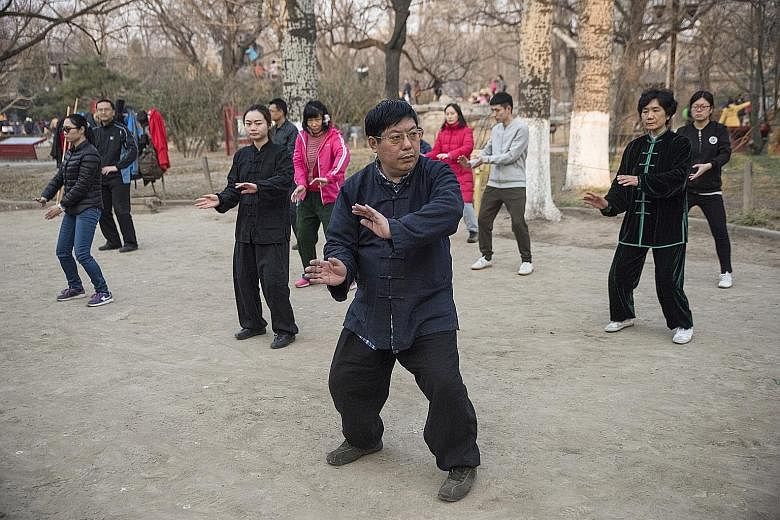BEIJING • Last year, Indian yoga made Unesco's list. In 2011, South Korea's taekkyeon became the first martial art so honoured.
So why does Chinese taiji not win similar international recognition?
That is the question on Mr Yan Shuangjun's mind as the annual deadline approaches for nominations to Unesco's Intangible Cultural Heritage of Humanity list, established by the United Nations agency to celebrate and protect the world's cultural diversity.
For the past decade, he has lobbied for the inclusion of taiji, a centuries-old martial art that combines flowing movements with deep breathing and meditation.
"Through taiji, one can understand Chinese culture, from medicine to literature, from philosophy to art," said Yan, who heads the Tai Chi Unesco Heritage Application Group in Wen county, Henan province, widely thought to be the martial art's birthplace.
As much as taiji advocates and fans insist that it embodies unique aspects of Chinese culture, they fear that if China does not secure it a Unesco listing, other countries might move ahead with their own variants.
It would not be the first time, they say.
Although taiji may have its roots in self-defence, in recent years, it has gained broad popularity as a therapeutic exercise, promoting physical fitness while reducing stress. Across China and beyond, its practitioners can be seen gathered in parks and other public spaces, moving slowly in unison through prescribed routines.
But that very popularity is adding to its advocates' concerns.
During the recently concluded session of the National People's Congress, a delegate from Henan, Mr Zhang Liyong, stressed the urgency of the matter. "Both South Korea and Japan are competing with us to get taiji registered. Especially South Korea. Some people there are claiming taiji was invented by Koreans. And since South Korea has already registered the Dragon Boat Festival as theirs, we should be alarmed."
China's Dragon Boat Festival commemorates the ancient poet Qu Yuan with boat races and a public holiday.
When Unesco added South Korea's Gangneung Danoje Festival to its list in 2008, some Chinese objected and argued that it was derived from the Dragon Boat Festival and accused the UN of endorsing Koreans' appropriation of Chinese culture. The Chinese festival was accepted in 2009.
Recognition confers prestige rather than a monetary prize. But that prestige means a lot to Mr Yan. So far, he has not heard whether the Chinese government will nominate taiji and he says he is getting anxious. The deadline is March 31.
"No news is bad news," he said.
When China drew up its national intangible cultural heritage list in 2006, taiji was on it. And in 2008, it was among China's 35 nominations to Unesco. But Mr Yan and his associates were told that Unesco found the application "too vague". They were asked to revise and resubmit it.
They withdrew it, hoping to offer it for consideration the next year. But then the rules changed. No country could submit more than two candidates. Taiji was shut out when China nominated Peking opera and acupuncture, both of which won Unesco recognition.
"Since then," Mr Yan said, "taiji has never stood out on the long list of Chinese heritage items waiting for inclusion."
Among the items that have won Unesco recognition for China in recent years are shadow puppetry and mathematical calculations based on the abacus.
The nominations are submitted to Unesco by the Ministry of Culture's intangible cultural heritage centre. Reached by telephone, a researcher at the centre, who declined to give her name, said it would not be convenient to discuss which candidates would be put forward this year.
Mr Zhang Jian, 57, a taiji master in Beijing, said it would be a shame if it failed again to be nominated.
"When people talk about gongfu, they usually think of the Shaolin Temple," he said, referring to the temple and its monks in Dengfeng county, Henan province, popularised in martial arts movies. "But Shaolin gongfu is more about performance. Taiji is different. It's all about personal practice and deserves more attention."
Mr Yan said he would keep up the campaign to win wider global recognition for Chinese taiji. "Compared with many other aspects of Chinese culture, taiji is relatively practical and could help China expand its soft power. Even our astronauts practised taiji, so we've already made it into outer space."
NYTIMES

